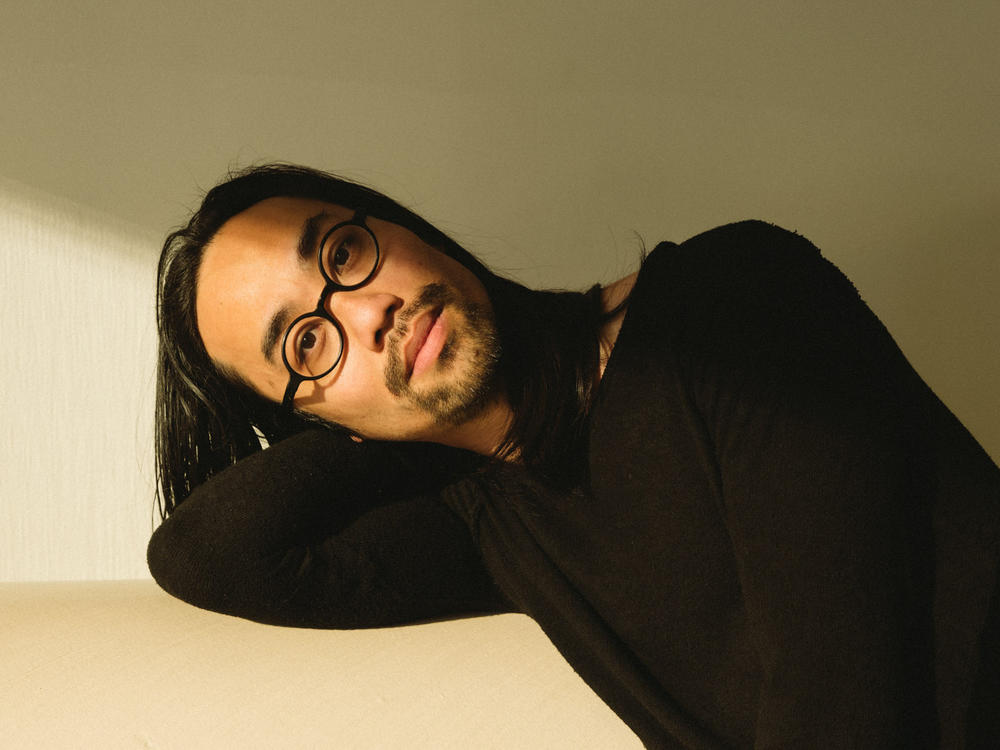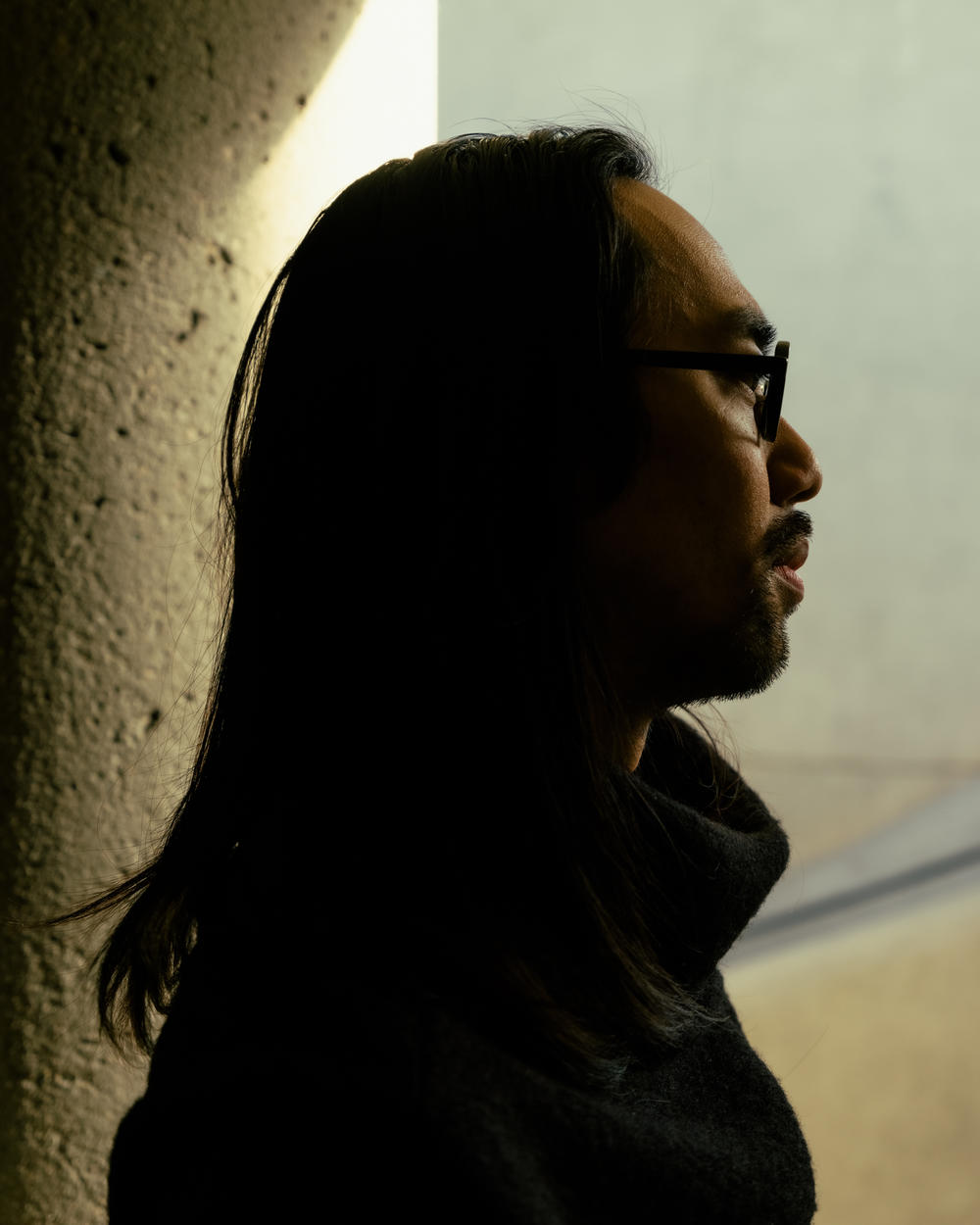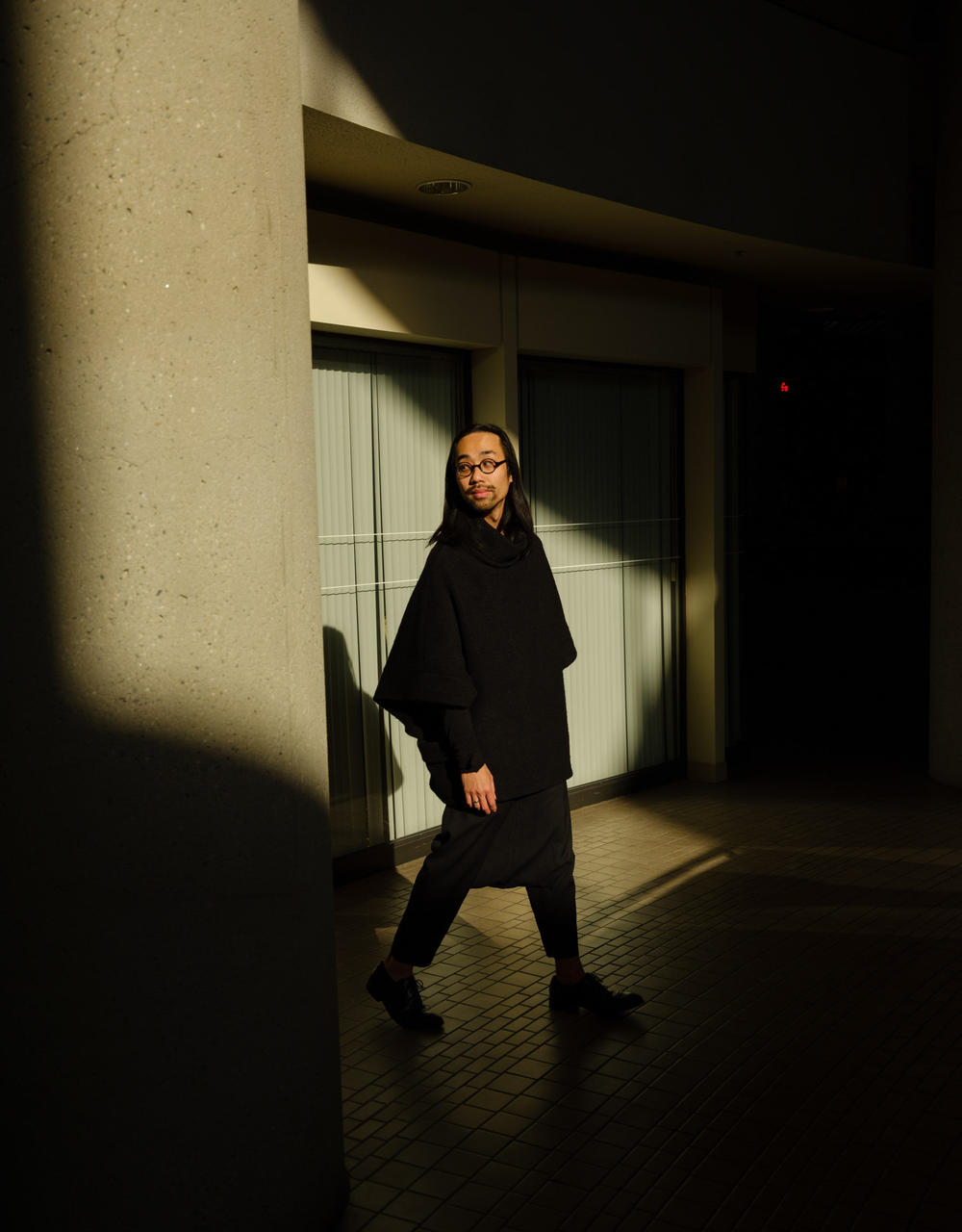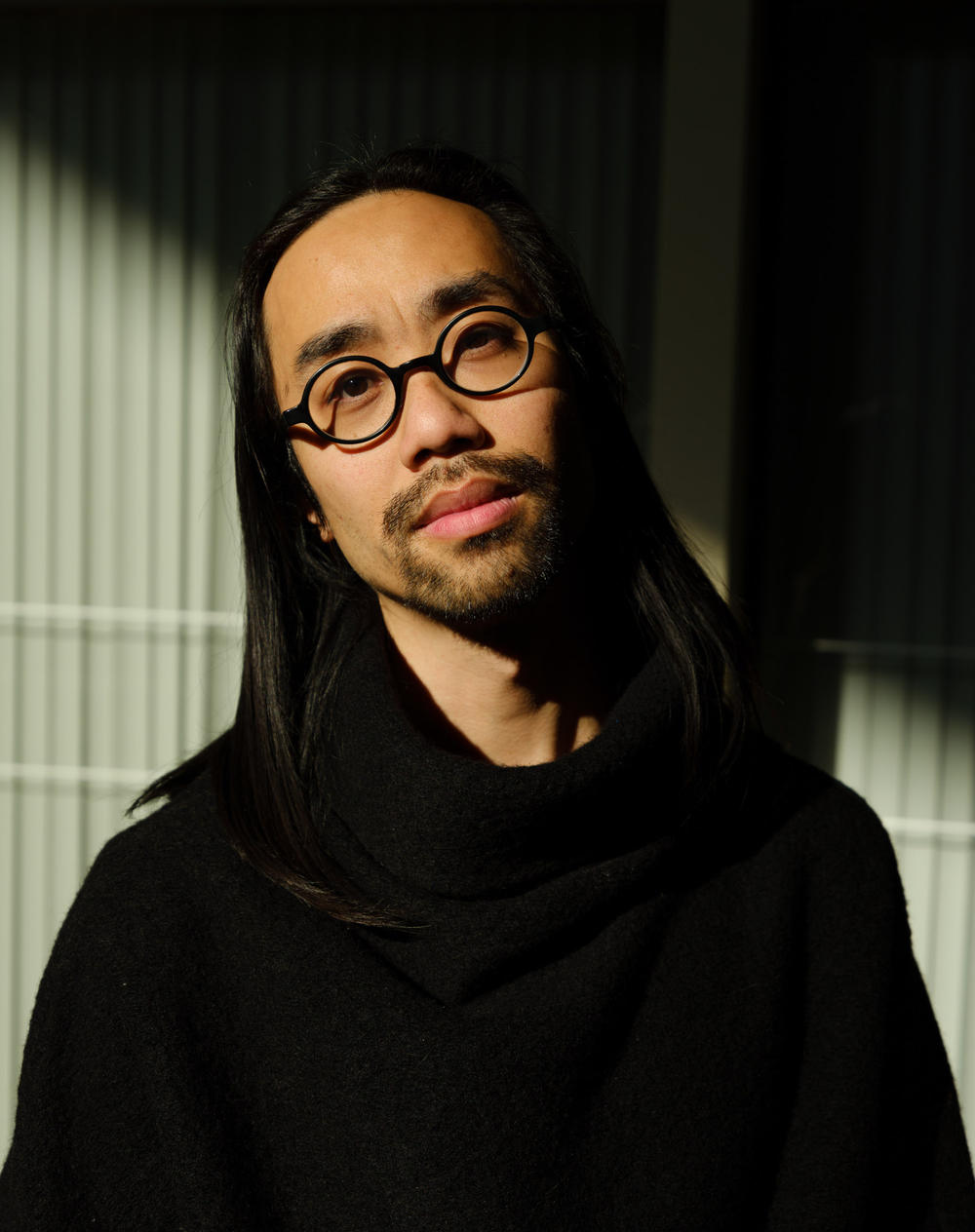Section Branding
Header Content
Patrick Shiroishi's music moves a Japanese American saga forward
Primary Content
Family dinner frightened the saxophonist Patrick Shiroishi.
It was late August 2022, and Shiroishi was due in Europe in exactly a month to open for the experimental metal trio Sumac, not only his first tour there but also one of his first tours ever. He had so many shows and sessions booked for the rest of the year, in fact, he would rarely be in Rosemead, the Los Angeles County town where he's lived his entire life, for much of the year. Now, at a family dinner to celebrate his aunt's birthday, Shiroishi, 35, just had to tell his parents.
"For the longest time, my parents fought me on music — 'When are you not going to go to shows or play shows? When are you just going to come home after work and relax?' " Shiroishi remembers, flashing a toothy grin. He folds his legs beneath himself on a park bench outside of his favorite Rosemead ramen spot.
"I definitely yelled at them about it," he continues with an uncomfortable sigh. "I said I'd quit when I was 30. Until then, don't bother me."
His parents, Allen and Uzuko, had indeed asked about that vow the month he turned 30. Shiroishi, however, had not quit. Instead, he doubled down on his own music during the next five years, releasing several dozen albums of roaring free jazz, warped instrumental metal and feather-light bop so luxurious it feels like a West Coast sunset. He became, in turn, a linchpin in an international network of young composers and improvisers, mining deep vulnerability in an expansive repertoire. The thread through much of that work was Shiroishi's excavation of his Japanese American heritage, how his family's complicated past in the United States shaped his present.
And now, as he prepared to make a major leap in his life — leaving his job of a decade as an instructor and manager at a nearby music school to pursue his music full-time — he felt that story again. As Japanese Americans, his parents had often sacrificed desire for stability, for the ability to provide for their family. As he prepared to tell his parents about his decision, he actually workshopped disaster scenarios with his therapist, trying to imagine what he'd say if his parents told him he was making a mistake.
He warned his brother, Andrew, that the news was coming at dinner and to prepare accordingly. He also found motivation from his wife, fellow saxophonist and Moonchild bandleader Amber Navran. No matter the consequences, it was a move he had to make.
"I need to play, to work through these emotions, to have an outlet for being angry about whatever's happening to people or a death in the family or anything," he says slowly, as if still processing that notion. "Playing is a core thing for me, necessary."
Shiroishi was born into a bifurcated identity, into the tension between understanding his ancestral roots and his compulsion to assimilate. While Uzuko's parents remained in Japan, Allen's family had already been in California for several generations. She would dispatch photos and videos of their firstborn home every week, eventually enough to fill 10 scrapbooks.
There were after-school classes in calligraphy and the abacus. Every Saturday, he dutifully attended the Japanese language school where his mother still works, bribed with McDonald's and taped cartoons for successful participation. Every Sunday, they would visit the family plot at Evergreen Cemetery, a 150-year-old sprawl known for its ethnic and racial diversity. They tended the family garden — the longtime pride of Allen's mother, Dorothy — as a group activity, and still do. Shiroishi relished the biennial trips to Japan, where they would feast and explore the forested countryside and absorb manga.
Still, for decades, Shiroishi wasn't sure what all this had to do with his real life. He resented the cemetery visits and the language lessons. Unending expectations from a family of doctors, pharmacists and corporate lifers like his father made him uneasy. "I don't think I wanted to be Japanese," Shiroishi says, staring at the sidewalk, index finger resting on the frame of his black-framed round glasses. "I was very much into, like, being 'normal' or Americanized or American."
So Shiroishi became a Boy Scout, joining his troop's Drum and Bugle Corps on trumpet. He dutifully studied the piano under his mother's attentive gaze ("Five times for the new piece, three times for the old," went a common command.) He became an Eagle Scout and immersed himself in the school band so much that, when he graduated, his peers pooled their money to buy him a cheap guitar rather than give the actual instructor a year-end gift. "I was very committed," he says, laughing, "to being a good boy."
Just as it's done for teenagers around the world for the better part of a century, though, rock and roll became the cornerstone of Shiroishi's modest rebellion. After squirreling away a week of lunch money, he would walk to a record store while his mom took his brother to basketball practice on Tuesdays to buy a single CD in secret. He played in a string of rock bands through high school and college, singing and drumming in the obviously irreverent Japanties and enlisting in the underground prog iconoclasts Upsilon Acrux on keyboards.
"I felt so much joy from the environment of just making music together, of community," he says, beaming. "That's really all I wanted to do."
His parents, however, wanted their sons to have the same stability they enjoyed; they doubted music could predictably provide it. When Shiroishi headed north to Chapman University, he majored in music therapy, not performance or composition, adding a second degree in classical guitar only after an instructor recruited him. Out of college, he helmed a therapeutic arts program for autistic children before leading the music school where he still worked when his family met for that fateful dinner in August 2022.
Something changed, though, in those years since he turned 30: He had begun studying his family's history in the United States and funneling it into his albums, pushing back against what he saw as the Japanese notion of "not talking about yourself, of keeping your cards to yourself." He wanted to work through his feelings about his family's struggles and resilience on tape. There was, after all, plenty to consider.
When Shiroishi was in eighth grade, Allen took a rare day off work to take his sons to the Japanese American National Museum in downtown LA. He wanted them to see one of the spartan shacks that housed Japanese natives and their descendants in the United States during World War II. The sight barely fazed Shiroishi then. But two years later, Shiroishi spotted a one-paragraph reference to those very internment camps in a history textbook. The story now surprised him — he badly wanted to be an American kid, so how had Americans wanted to do this to his predecessors?
When he asked his grandmother, Dorothy, what she knew about the saga, she went silent and stern. "She was this really bright human, but she just shut down when I mentioned it," he says, frowning. "You're like, 'Oh, no, I made my grandmother feel this way?' I never asked her about it again."
Dorothy died in 2012, at the age of 93. Shiroishi soon began questioning his aunt, Jo Ann, about their family's history, especially why Dorothy had gone cold when he asked about the camps. He learned she had met his grandfather, Patrick Hidemi Shiroishi, at California's Tule Lake, the largest of the United States' 10 so-called War Relocation Authority camps, just south of the Oregon border. He had been transferred to the notoriously harsh Tule Lake after writing to the government to renounce his citizenship out of frustration with the camps, their conditions and recent riots. Shiroishi recognized he wouldn't exist without this traumatic bit of serendipity, his entire origin story reduced to a mere blip in his schoolbook.
Shiroishi now had something personal to reckon with through his music. He had dedicated early albums to his grandparents, but he began to consider their story in bold new ways. Named for the newspaper at Tule Lake, 2017's tulean dispatch used extended technique and circular breathing to express confusion and exasperation through pieces with titles like "the screams of a father's tears."
Four years later, on Hidemi, the namesake grandson imagined the life of the grandfather he had never met after he left Tule Lake. In a dizzying series of multi-tracked trios, quartets and quintets for saxophone, Shiroishi wrestles with the terror of returning to a society that wanted to punish you for merely existing, but then exudes the absolute joy of survival. It was a breakthrough for Shiroishi and his first masterstroke, a realization not only of how much he had to say, but also his ability to execute complicated music about difficult topics.
"Part of me has this whole impostor syndrome, because I was never trained in the saxophone in some serious way," he says. "On the other hand, I realized I have my own story to tell, things I want to express."
He has since made a solemn ambient record about violence against Asian Americans, repurposed the sounds of the cemetery, and slipped Japanese samples into the gorgeous songs of the band Fuubutsushi. He released 19 albums in 2022; at least three were standouts in their respective fields, in part because of the questions of identity they examine.
Recorded in the reverberant parking garage beneath a local hot pot restaurant, for instance, his improvisational duet with saxophonist Marta Tiesenga, empty vessels, sounds like a jazz combo sprayed through an atomizer. His debut for transformative electronic label Touch, Evergreen, suspends field recordings from the cemetery where six Shiroishis are buried in a ruminative haze, saxophone glinting through the drone like sunshine through a storm. And the madcap second LP from his distorted sax-and-drums duo Oort Smog, Every Motherf***** Is Your Brother, arcs triumphantly from spiritual jazz to ecstatic metal across a single 29-minute track.
"Almost from the start, Patrick's music has been like a plant sprouting from the ground with one central stem. There's always been something emotionally intense about the way he plays, an outlet," says drummer Mark Kimbrell, who worked with Shiroishi for nearly a decade before they hatched Oort Smog. "And now, he's just blooming in multiple directions."
His work hinges on family history and identity in less explicit ways, too. He is fiercely collaborative, open to improvise or work with most anyone who asks. He loves the way musicians with experiences and perspectives distinct from his own might spark a novel idea. He tapes everything he plays, listening back for moments when he stumbled into something unforeseen.
But he especially relishes the way such connections foster community, building networks that often extend globally. It is, at least in part, an attempt to live up to stories he's heard about Hidemi, who spent his days in a Little Tokyo furniture store and his nights as a deacon in a nearby Buddhist temple.
"After work, he would go to families' homes to offer prayer with them, get home super late and restart that cycle. I don't know that many people would do that," he says. "When my parents would be like, 'Why are you going to a show after work?', that's the community I wanted to be in. When I was at work, I was only thinking about playing a show."
The moment Shiroishi broke the news at dinner about quitting his job, his brother Andrew began clapping, and any potential tension vanished. Sure, his parents wanted to know why this was the right decision, but they listened sympathetically. Their daughter-in-law's success with Moonchild helped, too, as a model of the work such a career entailed.
"I thought it was a good age to try. And if it doesn't work, he can go back to teaching music or whatever," his mother, Uzuko, says, Allen agreeing by her side. "I don't want him to be 50, thinking, 'I should have done that.' "
They had already taken pride, after all, in Shiroishi's attempts to share their family saga in such a public and provocative way, to express not only the anguish of their past but also the progress their journey documented. They keep a copy of everything he's released on a series of living room shelves, LPs tucked behind old school photos and even hanging on walls like family portraits. "It's amazing to me that he's taken our story and moved forward with it," Allen says. "He's not just doing music, but mastering the history behind it."
It's not just history that interests Shiroishi; it's future possibilities for kids who look like him and need to see themselves represented in experimental music. To wit, in March 2020, just before pandemic lockdowns began, Shiroishi met koto master and teacher Kozue Matsumoto and sculptor and shakuhachi player Shoshi Watanabe for lunch near downtown LA. They intended to discuss the possibility of a trio, employing traditional Japanese instruments within experimental idioms.
Shiroishi brought along recording gear just in case; by the end of the day, they had made a record, the emotionally volatile Yellow. It is, Matsumoto says, a perfect encapsulation of Patrick's approach — taking advantage of an unexpected situation to build a relationship and to say something surprising about the experiences and possibilities of Japanese Americans.
"We all struggle with stereotypes of who we are as Japanese Americans, as Asian Americans, but we want to define who we are," Matsumoto says. She stuns her students at the California Institute of the Arts when she plays them Yellow, where the koto and winds commingle in surreal dioramas, like light refracted by a series of cracked prisms. "Being Japanese American doesn't mean we all need to work in a sushi restaurant. This music can contribute to that idea of who we can be."
When Shiroishi was a kid, his parents would take the obliging pianist to see the orchestra at the Hollywood Bowl. On that stage, and most others, he spotted mostly white men, few if any fellow Asian Americans to convince him or his parents that making music might just be a way to live.
But during an East Coast tour late in 2022, just a month after he'd returned from that first trek to Europe, he looked into the audience and saw more Asian American faces than he'd even imagined. That message of change, he hopes, is central to his music, no matter how loud or loaded with trauma it becomes.
"It's really easy to feel like there's no hope, that things aren't going to get better, to stop fighting. Then it's all for sure going to get worse," says Shiroishi a few days after another family dinner sandwiched between tours, the first such gathering since his big August announcement. "That's hope, you know? And that's my core emotion — to not give up."
Copyright 2023 NPR. To see more, visit https://www.npr.org.




